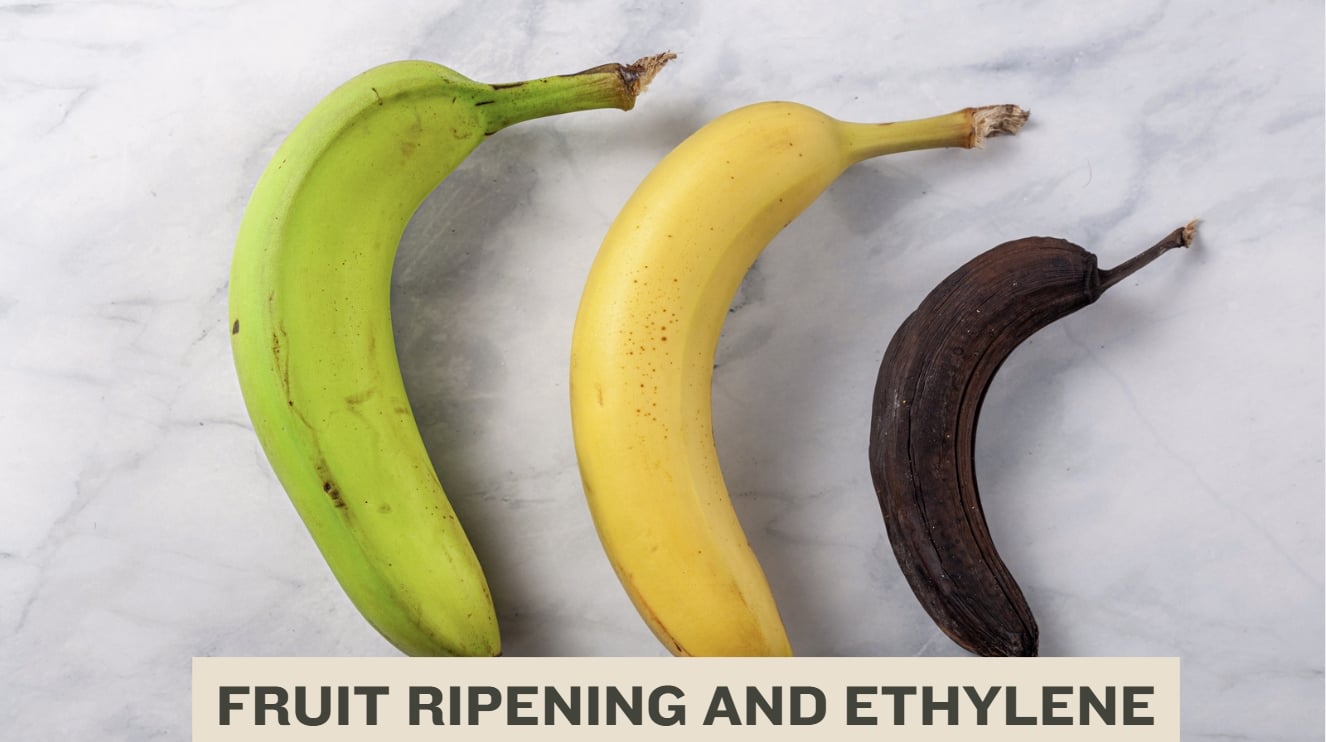Fruit Ripening and Ethylene
Fruit ripening is a vital process that transforms immature fruit into mature, edible forms. This transformation involves complex physiological changes. Ethylene is plant hormone that regulates this ripening process in many fruits.
What is Ethylene?
Ethylene (C2H4) is a gaseous plant hormone. It is produced by various plant tissues and plays a key role in fruit development. Ethylene is synthesised from the amino acid methionine through the 1-aminocyclopropane-1-carboxylic acid (ACC) pathway.
Triggers of Ethylene Production
Ethylene production can be stimulated by several factors:
- Environmental Factors: Temperature and humidity can affect ethylene levels.
- Mechanical Damage: Bruising or cutting fruits can increase ethylene production.
- Biotic Factors: Pathogens can trigger ethylene release.
- Developmental Cues: The maturity of the fruit influences ethylene synthesis.
Role of Ethylene in Ripening
Ethylene acts as a signalling molecule. It initiates and regulates the ripening process. Its key effects include:
- Starch to Sugar Conversion: Increases sweetness.
- Softening of Texture: Promotes cell wall degradation.
- Colour Changes: Breaks down chlorophyll and synthesises pigments like carotenoids.
- Aroma and Flavor Development: Produces volatile compounds that enhance taste.
Stages of Fruit Ripening
Fruit ripening occurs in three main stages:
- Pre-climacteric Stage:
- Low ethylene production.
- Fruits are firm with low sugar content.
- Climacteric Stage:
- Significant increase in ethylene production.
- Rapid changes in texture, colour, and flavour.
- Examples – Bananas, tomatoes, and apples.
- Post-climacteric Stage:
- Ethylene production may decrease.
- Fruits continue to ripen and are ready for consumption.
Factors Influencing Ethylene Production
Several factors affect ethylene production in fruits:
Genetic Factors
Different fruit species and varieties exhibit varying sensitivity to ethylene. This variability affects their production rates.
Environmental Conditions
- Temperature: Higher temperatures can accelerate ethylene production and ripening.
- Humidity: High humidity enhances the effects of ethylene.
Physical Damage
Bruising or cutting fruit can stimulate ethylene production. This leads to quicker ripening.
Ethylene and Post-Harvest Management
Managing ethylene is crucial in post-harvest handling. It helps extend shelf life and maintain fruit quality. Key techniques include:
- Ethylene Inhibitors: Substances like 1-Methylcyclopropene (1-MCP) slow down ripening.
- Controlled Atmosphere Storage: Reduces ethylene levels in storage environments.
- Temperature Management: Slows down ethylene production.
Ethylene in Commercial Applications
Ethylene is widely used in agriculture. It helps synchronise ripening for uniform harvests and marketing. Additionally, it is crucial in the production of certain fruits. For example, bananas are often treated with ethylene to ensure they ripen at the desired time.
Impact on Fruit Quality
Ethylene influences fruit quality. Proper management of ethylene levels can enhance the taste, texture, and appearance of fruits. This is essential for consumer satisfaction.
Ethylene’s Role in Other Plants
Besides fruit, ethylene affects various plant processes. It influences flower senescence, leaf abscission, and seed germination. About ethylene’s role in these processes is vital for optimising plant growth.
Ethylene and Climate Change
Climate change may impact ethylene production in plants. Changes in temperature and humidity can alter the ripening processes. This could affect crop yields and fruit quality.
Research and Innovations
Ongoing research aims to enhance ethylene management. Innovations in biotechnology may lead to genetically modified fruits with controlled ethylene production. This could improve post-harvest handling and extend shelf life.
Ethylene and Consumer Awareness
Consumers are becoming more aware of ethylene’s role in fruit ripening. About this process can help them select the best fruits. They can also store fruits to prolong freshness.
Ethylene and Organic Farming
In organic farming, ethylene management is essential. Organic methods often avoid synthetic chemicals. Natural alternatives to manage ethylene can be explored to maintain fruit quality.
Ethylene in Food Preservation
Ethylene’s role extends to food preservation. Techniques that control ethylene levels can enhance the longevity of stored fruits and vegetables. This is crucial in reducing food waste.
Ethylene and Transport Logistics
Transporting fruits requires careful ethylene management. Proper ventilation and temperature control can prevent premature ripening. This ensures fruits arrive at their destination in optimal condition.
Ethylene’s Historical Context
The discovery of ethylene’s role in ripening dates back to the early 20th century. Researchers identified its effects on plant growth and development. Since then, its applications in agriculture have expanded .
Ethylene’s Chemical Properties
Ethylene is a simple hydrocarbon. It is colourless and has a sweet odour. Its gaseous state allows it to diffuse quickly through plant tissues. This property makes it an effective signalling molecule.
Ethylene and Genetic Engineering
Genetic engineering techniques can modify ethylene production in plants. This can lead to the development of fruits that ripen more uniformly. Such advancements can benefit both growers and consumers.
Ethylene’s Economic Significance
The economic impact of ethylene in agriculture is substantial. Efficient ethylene management can lead to reduced losses and increased profits. This is crucial for sustaining the agricultural industry.
Ethylene and Consumer Products
Ethylene is also used in the manufacture of various consumer products. It is a key component in the production of plastics and other materials. About its properties can lead to better product development.
Ethylene and Environmental Considerations
The use of ethylene in agriculture raises environmental concerns. Sustainable practices are essential to minimise the ecological impact. Research is ongoing to find balance in its application.
Future Directions in Ethylene Research
Future research will likely focus on ethylene’s broader impacts. This includes its role in climate resilience and sustainable agriculture. Innovations in ethylene management will continue to evolve.


